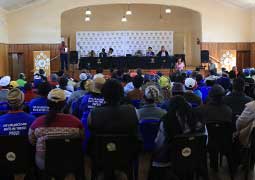
The proposed Marine Spatial Planning Bill, currently before Parliament’s Portfolio Committee on Environmental Affairs, is going to pave the way for the implementation of the “ocean economy”, also called “Operation Phakisa”, said Mr Tony Duba, the Chairperson of the Eastern Cape Provincial Legislature’s Portfolio Committee on Economic Development, Environmental Affairs and Tourism.
Speaking during public hearings on the Bill in Port Elizabeth today, he said the Eastern Cape Province was “not taking the draft legislation lightly” because of the current economic situation and the Bill’s potential to boost the economy of the province. “If passed into law, the Bill will pave the way for the long-awaited full implementation of the ocean economy,” said Mr Duba.
Parliament’s Portfolio Committee on Environmental Affairs is holding public hearings to get public inputs on the Bill, which seeks to promote sustainable economic opportunities through coordinated and integrated planning of the ocean space.
If passed into law, it will also develop and implement a shared marine spatial planning system to manage a changing environment that can be accessed by all sectors and users of the ocean.
Welcoming the Committee during public hearing meeting in Port Elizabeth, council Speaker of the Nelson Mandela Bay Metropolitan Municipality, Councillor Lawack Jonathan, said the Bill was a catalyst for integrated ocean governance and will ensure conservation of marine life and species.
“The coast is our asset and heritage and we should afford it the respect it deserves. It is also a principal source of food for millions of people. There is a connection between healthy ocean, healthy planet and a sustainable future,” he said. It was of utmost important that opportunities from the coast were harnessed, protected and conserved for future generations, he added.
Members of the public used the opportunity to highlight the plight of fishermen in the Eastern Cape and urged the Parliament to intervene to improve their conditions.
Mr Vusumzi Mbekwa, a fisherman from Humansdorp, told the Committee about working conditions and exploitation by employers. “Can the law not only look at conserving the natural resources, but also the wellbeing of human being who work in the ocean space?” he asked.
He said the Bill was silent about small-scale fishermen. “We also want to benefit from the ocean economy. Please legislate against irresponsible fishing by big companies.”
Mr Sibongiseni Dlamini who lost a brother when a fishing vessel carrying 17 fishermen, capsized last month, said the accident could have been avoided had the boat been in a good condition.
Committee Chairperson Mr Philemon Mapulane said some of the comments that don’t relate to the Bill would be referred to the Department of Agriculture, Forestry and Fisheries for further investigation. “We send our deepest condolences to those who lost loved ones in the tragedy of the shipwreck. I think it would be proper if it is investigated by the relevant bodies. It is not our mandate, but we can follow up so that those who lost loved ones can find closure by knowing exactly what happened,” said Mr Mapulane.
South Africa is currently developing its ocean economy, also called the “blue economy”, led by the Department of Environmental Affairs. It focuses on four priority sectors: marine transport and manufacturing, offshore oil and gas exploitation, aquaculture, and marine protection services and governance.
The term “blue economy” was first coined by Small Island Developing States (SIDS) and other coastal countries during the 2012 Rio Plus 20 United Nations Conference on Sustainable Development in recognition of the need to maximise the enormous economic potential of oceans and seas while preserving them. Since then it has emerged as a key component of the new global dialogue about the role of the oceans in sustainable development.
Blue economy refers to those economic activities that directly or indirectly take place in the ocean and coastal areas, use outputs from the ocean and put goods and services into oceans activities and the contribution of those activities to economic growth, social, cultural and environmental wellbeing.
The concept does not restrict itself to fishing and marine resource, but encompassed more than just tuna fishing and other fishery trading to include the management and sustainable development of minerals and energy resources from our oceans.
By conceptualising the oceans as a development space where special planning integrates conservation sustainable use, resource extraction, sustainable energy production and transport, the blue economy offers an alternative economic approach that is guided by environmental principles.
South Africa recognises that the oceans can make a significant contribution to the sustainable economic development of many coastal and island developing states.
2 August 2017
Sakhile Mokoena

